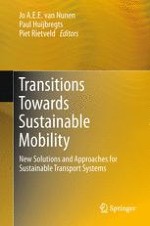2011 | OriginalPaper | Buchkapitel
6. Rewarding Peak Avoidance: The Dutch ‘Spitsmijden’ Projects
verfasst von : Jasper Knockaert, Jessie Bakens, Dick Ettema, Erik Verhoef
Erschienen in: Transitions Towards Sustainable Mobility
Verlag: Springer Berlin Heidelberg
Aktivieren Sie unsere intelligente Suche, um passende Fachinhalte oder Patente zu finden.
Wählen Sie Textabschnitte aus um mit Künstlicher Intelligenz passenden Patente zu finden. powered by
Markieren Sie Textabschnitte, um KI-gestützt weitere passende Inhalte zu finden. powered by
